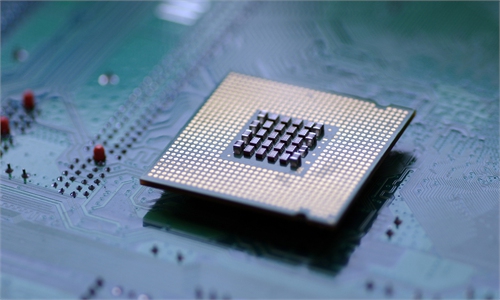China's semiconductor IP sector accelerates drive for self-reliance
Money pours in, but top professional talent is still lacking: analysts

Workers make chips at Anhui Dongke Semiconductor Co in East China's Anhui Province on Saturday. The company is located in the Anhui Ma'anshan Economic and Technological Development Zone, and it is mainly engaged in the design, production and sales of green power chips. Photo: VCG
The semiconductor intellectual property (IP) sector in China is growing rapidly by the day, with tens of thousands of chip design companies striving for self-reliance amid an ever-escalating China-US tech rivalry and lingering US crackdown. But they still face challenges, including the lack of top talent, analysts say.On Wednesday, AkroStar, a developer of semiconductor IP research and development (R&D) and services, raised more than 500 million yuan ($77.71 million), taking its total fundraising to almost 1 billion yuan within less than a year.
Gaorong Capital, Matrix Partners China, the University of Macau Development Foundation, Sequoia China and others invested in the young company, which was only founded in June 2020.
The new round of finance will be used to attract high-end talent to undertake advanced chip IP R&D, according to the Zhuhai, South China's Guangdong-based company.
AkroStar Chairman Zeng Keqiang said that the company has brought its IP products and services to the market in rapid pace and has exceeded its sales target, creating fast-growing revenue, media outlet thepaper.cn said.
"The high level of recognition by capital and industry has given us confidence to empower the upgrading of China's IC industry with creative IP technologies," Zeng was quoted as saying.
Yue Bin, a founding partner of Gaorong Capital - an investor in AkroStar - said that IP remains an essential part of China's chip design, and the venture capital sector has always given lots of attention to the business.
Semiconductor IP provides for reusable design components, such as cell and chip designs that can be used to make advanced integrated circuits. According to research and advisory firm Mordor Intelligence, the Asia-Pacific is the biggest market for semiconductor IP, with the leading markets being the Chinese mainland, India, Japan, South Korea, the island of Taiwan and Singapore.
About 20,000 to 30,000 chip design companies work in the Chinese mainland, but most of their underlying technologies still rely on licensing from US and European companies, Lin Meibing, an industry analyst, told the Global Times on Wednesday.
But there are some leading chip IP companies in the country, including Chengdu Analog Circuit Technology Inc, VeriSilicon and Innosilicon.
"If China's chip design process speeds up, massive opportunities will be given to semiconductor IP companies. That will also facilitate downstream chip design companies to break through a major bottleneck in the semiconductor sector, allowing domestic players to shake off reliance on foreign companies," Lin said.
However, in the areas of GPUs, CPUs, auto chips and memory chips, foreign companies have cultivated and monopolized the business for a long time, leaving a wide gap between Chinese chip designers and those from the US, the UK and Japan, according to the analyst.
"But Chinese chip design companies have huge opportunities in emerging sectors, namely artificial intelligence chips, especially for vehicles, ," Lin said, citing Beijing-based Horizon Robotics as a leading provider of cutting-edge AI chips, which boasts advanced capabilities in designing AI algorithms and chips.
In particular, China, the US and the Europe are in the same leading position in terms of AI chips, Lin stressed, adding that "the tangled US-China tech war has brought opportunities for China to develop self-grown chip companies. Unlike the past, the capital market has increased its interest in funding the semiconductor industry."
However, some blind and hasty investment in the sector has caused concerns. As capital and companies swarmed into the chip sector due to national support, some projects have already failed without making any achievements, an industry expert who asked to remain anonymous told the Global Times on Wednesday.
The expert urged the central government to concentrate its resources on some key companies that have experience and been around for many years, rather than those starting from scratch.
Talent is the most-needed resource in China's chip sector - especially people who are familiar the whole industry chain from chip design and manufacturing to operations, the expert said, adding that by putting the limited talent pool into some key areas, China can make breakthroughs toward chip self-reliance.
Lin agreed that top talent is what the Chinese mainland lacks, and most companies are willing to pay top dollar to hire senior chip experts from the island of Taiwan, South Korea and the US.



